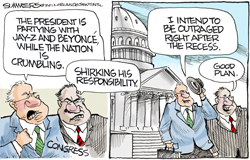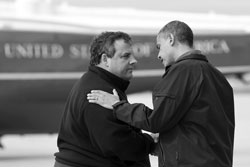People gathered in San Juan, Puerto Rico to mourn the thousands who died in the aftermath of Hurricane Maria last year, on Thursday, Sept. 20. Government officials denounced the inactive role which the U.S. federal government has played in recovering.
Congress has invested billions of dollars in efforts to help reconstruct Puerto Rico after the Category-4 hurricane hit the island last year, but devastation continues to ensue.
Danica Coto, from The Associated Press, and based in Puerto Rico, said that eight months after the storm, “major power outages are still being reported, tens of thousands of insurance claims are pending, and nearly 60,000 homes have temporary roofs unable to withstand a Category-1 hurricane.”
The mayor of San Juan expressed frustration with U.S. relief efforts through the Federal Emergency Management Act (FEMA) and other federal assistance programs.
She told CNN in an interview, “The [Trump] Administration killed the Puerto Ricans with neglect. The Trump Administration led us to believe they were helping when they weren’t up to par, and they didn’t allow other countries to help us.”
According to Ralph Cuseligo, DSW., an assistant professor of social work, “the U.S. government could have done more to provide aid to Puerto Rico in the wake of Maria.”
He continued, “This is due to a multitude of factors, but especially the way the current administration handled the response efforts and mismanagement by FEMA leadership.”
Paul Humphrey, an associate professor of world languages and culture, explained, “There’s been an issue with the two versions of FEMA. There’s a Puerto Rican version and U.S. version.”
“Have they given aid? Yes. Have there been a lot of pushes to disperse this aid? Yes. But, there are a lot of issues on the ground with how aid is dispersed,” Humphrey explained.
“There was [also] a problem with the Jones Act, which prevented aid going straight to Puerto Rico, as it could have done. FEMA [was just one of many] issues,” Humphrey added.
The relief efforts of Hurricane Maria have also sparked debates in Puerto Rico regarding their status in the U.S.
Former Governor of Puerto Rico Aníbal Acevedo-Vilá believes that it’s more than an economic issue, Puerto Ricans are struggling with their cultural identity. They are U.S. citizens, but are not viewed as American.
In speaking with Brittany Macaluso, a sophomore social work student, about mainland America’s lack of connection to Puerto Rico. She believes that it stems from proximity and differing cultural backgrounds.
“Puerto Ricans have their own culture that does not align with the states, so they feel less attached to American tradition,” Macaluso said.
Whether Puerto Ricans view themselves as Americans, Humphrey claims, “[It is] a very contentious question… The fact of the matter is Puerto Ricans are American citizens.”
However, he continued, “Whether [Puerto Ricans] view themselves as Americans or not… it doesn’t mean that the Federal government has any less of a responsibility to help them as if they were part of the 50 states.”
Cuseligo explained, “Our attention span as Americans is short… stories of Puerto Rico’s needs and Maria recovery efforts fade. With Puerto Rico you are looking at recovery and rebuilding that will take 5-10 years.”
“Americans forget, especially when we are not directly impacted by an experience. I feel many Americans may not feel connected to Puerto Rico, as they might with U.S. states,” Cuseligo concluded.
The neglect that Puerto Rico suffered from the mainland might stir feelings of resentment, furthering their want to disassociate from the U.S.
Cuseligo believes that “the lack of relief and recovery efforts in the wake of Maria, especially as time goes on [will foster resentment].”
Such negligence at the federal level demonstrates the limbo Puerto Rico operates under.
The islanders live without the advantages or burdens that being a U.S. state comes with.
Currently, they are subject to federal regulations: struggling to keep their traditions and battling economic problems, especially after Hurricane Maria last year.




